

Liberals and Markets. This is a succinct way of suggesting that libertarians and liberals share similar personalities and outlooks.
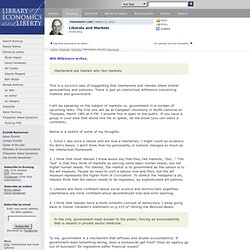
There is just an intellectual difference concerning markets and government. I will be speaking on the subject of markets vs. government in a number of upcoming talks. The first one will be at Campbell University in North Carolina on Thursday, March 18th at 6 PM. DailyGood: News That Inspires. WordPress.com. America 3.0: The Coming Reinvention of America. The United States of America is in crisis.
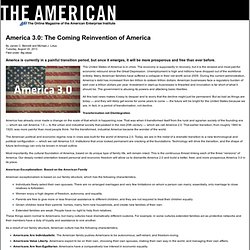
The economy is supposedly in recovery, but it is the slowest and most painful economic rebound since the Great Depression. Unemployment is high and millions have dropped out of the workforce entirely. Many American families have suffered a collapse in their net worth since 2009. During the current administration, America’s debt has increased from ten trillion to sixteen trillion dollars. American businesses face a regulatory burden of well over a trillion dollars per year. All this bad news makes it easy to despair and to worry that the decline might just be permanent.
Transformation not Disintegration.
Poverty and Welfare. Highlights of the Libertarian Party's "Ending the Welfare State" Proposal From across the political and ideological spectrum, there is now almost universal acknowledgement that the American social welfare system has been a failure.

Since the start of the "war on poverty" in 1965, the United States has spent more than $5 trillion trying to ease the plight of the poor. What we have received for this massive investment is -- primarily -- more poverty. Our welfare system is unfair to everyone: to taxpayers who must pick up the bill for failed programs; to society, whose mediating institutions of community, church and family are increasingly pushed aside; and most of all to the poor themselves, who are trapped in a system that destroys opportunity for themselves and hope for their children. The Libertarian Party believes it is time for a new approach to fighting poverty. CF&P. Does the War on Poverty Fight Destitution or Subsidize It? Americans Are Far More Compassionate than "Socially Conscious" Europeans. When I’m in Europe giving speeches and participating in conferences, it’s quite common that folks on the left will attempt to discredit my views by asserting that Americans are selfish and greedy.
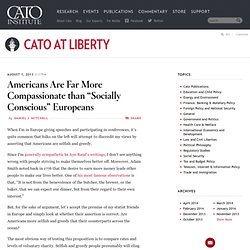
Since I’m generally sympathetic to Ayn Rand’s writings, I don’t see anything wrong with people striving to make themselves better off. The Problem of Political Authority - The Symposium Begins. As Bas mentioned a few weeks ago, today begins our symposium on Michael Huemer’s new book The Problem of Political Authority.
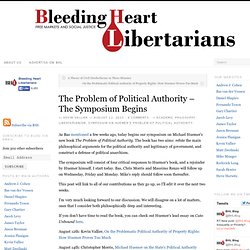
The book has two aims: refute the main philosophical arguments for the political authority and legitimacy of government, and construct a defense of political anarchism. The symposium will consist of four critical responses to Huemer’s book, and a rejoinder by Huemer himself. I start today. Bas, Chris Morris and Massimo Renzo will follow up on Wednesday, Friday and Monday. Mike’s reply should follow soon thereafter. This post will link to all of our contributions as they go up, so I’ll edit it over the next two weeks.
I’m very much looking forward to our discussion. If you don’t have time to read the book, you can check out Huemer’s lead essay on Cato Unbound here. August 12th: Kevin Vallier, On the Problematic Political Authority of Property Rights: How Huemer Proves Too Much. Department of Economics. The sticky label of 'Social Darwinism', Alberto Mingardi. Advocates of the market economy are often dismissed as heartless and deaf to the needs of the poor.

"Social Darwinism" seems to be a label perfectly tailored to convey such an alleged preference for efficiency over humanity. The concept, as we know it and as President Obama likes to use it, is almost entirely the legacy of a single book: Richard Hofstadter's beautifully written and deeply misleading "Social Darwinism in American Thought". Even a thoughtful writer such as John Kay, in an otherwise insightful article on the lessons of evolutionary thinking for economics and business, has fallen into the trap, somehow portraying Herbert Spencer as a "ludicrous figure" dear to those that like to play with eugenics. WEST HEALTH ADVANCES COST-CUTTING MISSION Page 2 of 2. Wellbeing and Welfare, College Economics Topics. The word "welfare" has two very different meanings in economics.
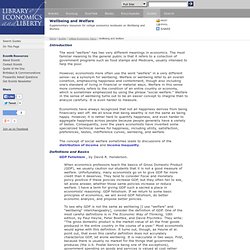
The most familiar meaning to the general public is that it refers to a collection of government programs such as food stamps and Medicare, usually intended to help the poor. However, economists more often use the word "welfare" in a very different sense--as a synonym for wellbeing. Welfare or wellbeing refer to an overall condition, emphasizing happiness and contentment, though also including one's standard of living in financial or material ways. In praise of Over-Legislation (the essay), Alberto Mingardi. This very same month in 1853, the Westminster Review was publishing a truly seminal article in the history of classical liberalism: "Over-Legislation" by Herbert Spencer.
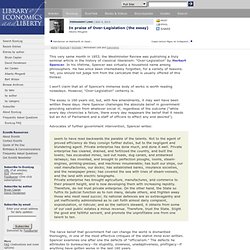
In his lifetime, Spencer was virtually a household name among philosophers. He has since been irremediably forgotten, for a variety of reasons. Yet, you should not judge him from the caricature that is usually offered of this thinker. I won't claim that all of Spencer's immense body of works is worth reading nowadays. However, "Over-Legislation" certainly is. Technology for the Common Good. America's Worst Charities. National Veterans Service Fund notes on its website that "war does not end on the battlefield.
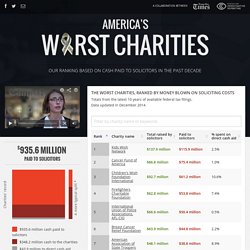
" Instead, the site goes on to say, American veterans and their families have been left without the help they need to overcome critical health and psychological problems at home. National Veterans Service Fund says it offers guidance to veterans to help them qualify for aid they otherwise would go without. It also touts the "limited medical assistance" the charity hands out to needy veterans. Those promises have helped persuade donors contacted over the phone and in mailers to give $70 million over the past decade. The for-profit solicitors paid to raise that money kept more than half. The percent going to professional solicitors has increased over time. Philip Kraft, president of National Veterans Service Fund, said his charity buys wheelchairs, provides grocery store gift cards and pays rent for needy veterans. Doing Bad by Doing Good, Why Humanitarian Action Fails Book Panel. The Beacon: The Blog of The Independent Institute. By John C. Goodman • Wednesday June 5, 2013 9:21 AM PDT • 0 Comments New Most people in public policy do not understand complex systems.
They really don’t understand social science models either. As a result, the idea that a policy based on good intentions could actually make things worse is beyond their comprehension. Take health policies designed for low-income patients. This problem is not unique to healthcare. The cheapest form of housing, for example, is prefabricated housing.
In general, the middle class tends to have access to the benefits of capitalism. Why GMO Myths Are So Appealing and Powerful : Collide-a-Scape. Guest post by Cami Ryan , a Canadian agricultural researcher: Last week, an executive with a biotech trade group asserted in an interview that it wasn’t too late to win the hearts and minds of consumers suspicious of genetically modified foods. Biotech advocates just need to do a better job of explaining the technology and its benefits. The headline for the piece read: Foundation for Free Enterprise Ed. Moderating the Dark Side of Emotional Morality with the Bright Side of Market Morality: The Independent Review. El Alto: Where Leftism Meets Laissez Faire. Words of wisdom. I was looking around the website of the Center for the Philosophy of Freedom at the University of Arizona, with which many of the BHL bloggers have been affiliated in one way or another.
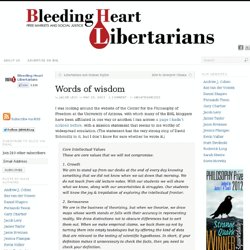
I ran across a page I hadn’t noticed before, with a mission statement that seems to me worthy of widespread emulation. (The statement has the very strong ring of David Schmidtz to it, but I don’t know for sure whether he wrote it.) Core Intellectual Values These are core values that we will not compromise. 1. Growth We aim to stand up from our desks at the end of every day knowing something that we did not know when we sat down that morning. We do not teach from old lecture notes. A blog is something different from an academic research and teaching school, and different norms apply in different settings– but these seem to me very attractive norms and ones to aspire to live up to, in university and non-university settings alike. Dwight Lee on Ebenezer Scrooge's Morality. The first Scrooge [before the visit of the three ghosts] satisfied only the requirements of the first morality, which I call mundane morality, while the second Scrooge [after the ghosts' visits] enthusiastically embraced the second morality, which I call magnanimous morality.
Economists who want to make a moral case for free markets need to take both moralities into account. This is from Dwight R. Lee's Econlib Feature Article for May, "The Two Moralities of Ebenezer Scrooge. " Why run an article about this in May rather than, as is traditional, December? Welfare before the Welfare State - Joshua Fulton. Many people think life without the welfare state would be chaos. In their minds, nobody would help support the less fortunate, and there would be riots in the streets. Little do they know that people found innovative ways of supporting each other before the welfare state existed. One of the most important of these ways was the mutual-aid society. Mutual aid, also known as fraternalism, refers to social organizations that gathered dues and paid benefits to members facing hardship.
According to David Beito in From Mutual Aid to the Welfare State, there was a "great stigma" attached to accepting government aid or private charity during the late 18th and early 19th centuries.[1] Mutual aid, on the other hand, did not carry the same stigma. Mutual aid was particularly popular among the poor and the working class. By the 1920s, at least one out of every three males was a member of a mutual-aid society.[4] Members of societies carried over $9 billion worth of life insurance by 1920.
Notes. Compassionate conservatism. Origins of the term[edit] Historian and presidential advisor Doug Wead may have been the first person to use the phrase compassionate conservative. In 1977, Wead wrote a book about Kolkata, India, entitled The Compassionate Touch.[1] In 1979, he gave a popular speech entitled “The Compassionate Conservative” at the annual Washington Charity Dinner. Just another WordPress.com site. How Free Markets and Human Ingenuity Can Save the Planet. The Infinite Resource: The Power of Ideas on a Finite Planet, by Ramez Naam, University Press of New England, 352 pages, $29.95.
Www.iea.org.uk/sites/default/files/publications/files/IEA Pursuit of Happiness web.pdf. Rob Reich: What Are Foundations For? Judge Richard Posner, one of the foremost American jurists outside the Supreme Court, once observed, “A perpetual charitable foundation . . . is a completely irresponsible institution, answerable to nobody. It competes neither in capital markets nor in product markets . . . and, unlike a hereditary monarch whom such a foundation otherwise resembles, it is subject to no political controls either.” The Big Truck That Went By. Christopher Coyne Book Panel: Doing Bad by Doing Good. Calculating the Social Impact of Job Creation - Compass Partners.
Portrait of a Modern Feminist: Amity Shlaes. March 14 2013 Charlotte Hays. Journals/jls/21_2/21_2_1.pdf. The Psychology of Everything: What Compassion, Racism, and Sex tell us about Human Nature On Human Evil: Concrete Down the Drain Edition, Garett Jones. When people have little incentive to behave well, and when nobody is watching, what do people do? The last few years have given us millions of opportunities to answer that question as people living in foreclosed homes decided whether to leave those homes in decent condition or to instead pour concrete down the drain.
Is a Free Market really good? : Libertarian. Field Notes on the Compassionate Life: A Search for the Soul of Kindness: Marc Ian Barasch: 9781579547110: Amazon.com. Graduate & Undergraduate Fellowships. The Greater Good Science Center offers annual fellowships to UC Berkeley Undergraduate and Graduate students whose work relates to our mission. The fellowship program aims to attract scholars from across a broad spectrum of academic disciplines, with a particular focus on the social-behavioral sciences.
Arthurbrooks.aei.org/wp-content/uploads/2012/07/Bradley-lecture-final.pdf. Home Page – The Compassionate Friends. Journal Tribune: York County's Only Daily Newspaper > News > ‘Army of compassion’ takes to Saco streets. Compassion Action Network Home Page. Conference to promote community compassion. DANBURY -- Government and spiritual leaders, renowned Dr. Bernie Siegel and Scarlett Lewis, whose son died in the Sandy Hook Elementary School shootings Dec. 14, are among the voices coming to Danbury next month for a community conversation on compassion.
The two-day Compassion and Creativity Conference on April 12 and 13 aims to discuss compassion and its value in personal and professional communities. Five panel discussions will be followed by question-and-answer sessions. The Global Integrity Report. Thomas Sowell: The Poverty Empire. "Free or Equal" Teaser. Dr Mark Pennington - 'Rescuing Social Capital from Social Democracy'
Why Are the Agreeable Anti-Market? Once you grant that personality has an important effect on ideology, it's only natural to wonder why. Gerber et al propose what they describe as "two tentative and equally plausible possibilities here, one focused on other regarding judgments and the other focusing on self-interested behavior. " Possibility #1: Some personalities are less self-interested than others.
Homeless to Harvard. P.J. O’Rourke: Atlas Shrugged. And So Did I. - Ideas Market. Jeff Sachs is Right. The World Dialogue: Can Capitalism be Compassionate? Why Do People Believe Scientifically Untrue Things? Education's Missing Apple: The Free Enterprise Solution? Walter E Williams - Cure for Poverty. Compassion. Compassion and the Market. Love, compassion, tolerance and free market economics. News That Inspires. Market. Steffy: The free market lacks compassion. Financial assistance for the poor should be the responsibility of charities, not government. Robust Political Economy. Advocating liberty daily.
The Free Market: Compulsory Compassion. Entrepreneurs Are the Good Guys. (6) Jeffrey Tucker. The Morality of Capitalism. From death TO life. Risking Light Documentary. Hillsdale College - Home. Bait and Switch. The Independent Institute's 25th Anniversary Video. Women For Liberty. Can the Internet Save Us? The Free Market: Compulsory Compassion. The Beacon. The Power and Vitality of Living Economics. Financial assistance for the poor should be the responsibility of charities, not government. The Case Against Government Bans on Feeding the Homeless. Living Economics: Yesterday, Today, and Tomorrow. Real Good For Free: The Paradox of Leisure Time. Facebook. Priceless: Curing the Healthcare Crisis. The 30 Day Reading List that will Lead You to Becoming a Knowledgeable Libertarian.
Helping Those in Need. Freedom: It’s good for your health. Helping the poor to save: Small wonder. What parts of compassion and free market economics are fundamentally incompatible, and what would the middle ground look like. Making Life Fair by John Stossel on Creators. Is Economic Freedom Fair? - Stossel's Take Blog - Fox Business. Dan Pallotta: The way we think about charity is dead wrong. Economics A-Z terms beginning with A. Walter E Williams - Cure for Poverty. Responsibility to the Poor. Poverty: The audacity of hope. David Henderson - Joy Of Capitalism.